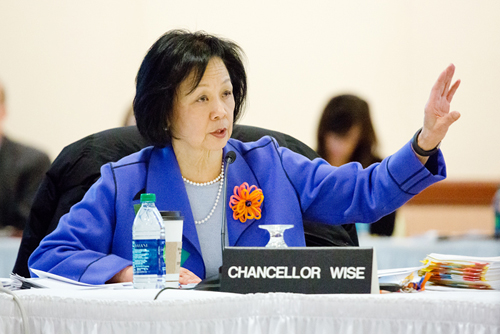By Michael Tarm and Tammy Webber
Associated Press

Phyllis Wise
CHICAGO (AP) — The University of Illinois announced Aug. 7 that several administrators — including Chancellor Phyllis Wise, who resigned earlier this week — violated school policy by using private emails to hide sometimes sharply worded, disparaging correspondence from public view.
Hundreds of pages of emails released simultaneously include discussions about controlling the damage from a high-profile controversy spurred by the chancellor’s revocation of a job offer to a professor who sent anti-Israel Twitter messages.
Emails on three topics — professor Steven Salaita and his tweets, the hiring of 1970s-era radical James Kilgore and the opening of the Carle Illinois College of Medicine — should have been turned over in response to a Freedom of Information request, the university said in its statement.
Wise, whose salary was nearly $550,000 this year, appeared to understand her emails could land her in trouble.
In an email dated Sept. 18, 2014, she wrote to one employee that she was purposely not communicating on the university’s email system because of a litigation matter — one that was not related to the professor, Kilgore or the medical school.
“We are doing virtually nothing over our Illinois email addresses,” Wise wrote. “I am even being careful with this email address and deleting after sending.”
University spokesman Tom Hardy would not say if Wise was asked to step down before she resigned Thursday. Wise hasn’t explained why she was resigning, citing only “external issues” on Thursday.
Hardy also said any question of discipline for remaining employees who failed to disclose personal emails “would have to be determined by the president of the Board of Trustees.” There is no immediate plan to hold a special meeting to discuss the emails, he added Friday.
The university became aware of the alleged email violations in late April, then promptly launched an official ethics inquiry, its Friday statement says. University President Timothy Killeen added that the university “takes its commitment to FOIA compliance and integrity seriously.”
Both Wise’s office and the university spokesman said she was traveling and unavailable for comment. She did not immediately respond to a message left at a residential phone in Champaign. Her resignation is effective Aug. 12.
Some emails bemoan university operations as a whole.
In one, dated July 31 of last year, Wise wrote to Ilesanmi Adesida, the university’s provost, commiserating about complaints over the poor quality of a promotional video being used during a search for a new university president. Wise writes: “I think I still believe that a failed search is the best thing that could happen. Before signing off, she adds: “This place is so messed up.”
Adesida writes back later, saying, “I agree, this place is messed up. In my opinion, the University does not need for a President. … Well, we better get ready for the rain to fall. More controversy coming on.”
Wise’s decision to rescind a job offered to Salaita led to him filing a still-pending lawsuit against her and the school. It also prompted bad publicity in the academic world, where some questioned whether his right to free speech had been violated.
Salaita had written a series of tweets in 2014 complaining about Israeli military action in Gaza. Some university donors complained to Wise that the messages were anti-Semitic.
In others emails released Friday, administrators lamented that the school did not have better procedures in place to prevent hiring scandals.
“We have run into a buzz saw again!” Adesida wrote on July 24, 2014. “One thing that we would like to do is to figure out how we prevent this sort of highly charged and negative blow back like we have had on Kilgore and now Salaita in the future. … This is potentially a slippery territory!”
Messages left for Salaita’s lawyers weren’t returned Friday.
Kilgore served time for his role in a 1975 bank robbery committed by members of the radical Symbionese Liberation Army. He was eventually rehired in December months after the university told him it would no longer hire him. (end)



